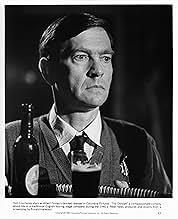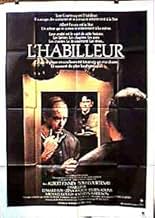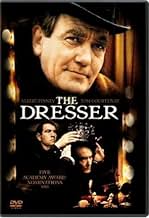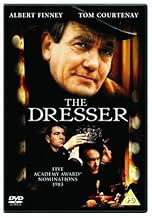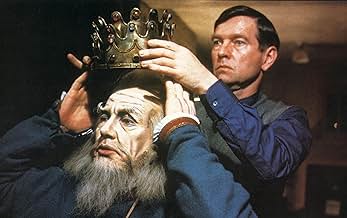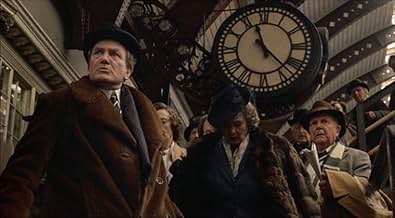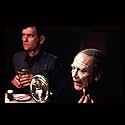IMDb-BEWERTUNG
7,5/10
5998
IHRE BEWERTUNG
Füge eine Handlung in deiner Sprache hinzuPersonal assistant Norman struggles to get deteriorating veteran actor Sir through a difficult performance of King Lear.Personal assistant Norman struggles to get deteriorating veteran actor Sir through a difficult performance of King Lear.Personal assistant Norman struggles to get deteriorating veteran actor Sir through a difficult performance of King Lear.
- Für 5 Oscars nominiert
- 5 Gewinne & 17 Nominierungen insgesamt
Anne Blackman
- Beryl
- (as Anne Mannion)
Empfohlene Bewertungen
Adapted by a 1981 Broadway sensation, its film counterpart is a hidden treasure of its time (although it achieved 5 nominations in the Oscar including BEST PICTURE, BEST DIRECTOR, BEST ACTORX2 and BEST ADAPTED SCREENPLAY) but has been rarely mentioned and seen by a younger generation, I have no idea of its existence until recently. I feel kind of cherished to have a chance to watch this UK production since the play-in-a-play structure generally is my cup of tea.
Then it proves that this is an exceedingly diverting film from the late director Peter Yates even though the quintessence of pleasure may lie in Finney and Courtenay's crack two-hander, which is beyond any thespian methods, two utterly gallant performances brilliantly deliver every tiny little nuance and never descend into a stasis of tedious affectation. Theatrical adaption has always been an impeccable showcase for actors. A copybook triumph from both Finney and Courtney. The King Lear play in the film proffers a tour-de-force stage for Finney's expertise and his overpowering sway is both intimidating and entertaining; as for Courtenay, whose character molding even merits more pluck due to the self-challenging devoutness. Which one I prefer, after some contemplative thinking, despite of Finney's pretty fierce endeavor, I will choose Courtenay, a lesser known actor but achieves a more startling reverberation.
Among the supporting roles, Eileen Atkins is managing to steal some flare from two leading players, she is so underrated and should be ranked alongside Maggie Smith, Judi Dench and Helen Mirren, among the most venerated names inside the so-called UK Dame coterie.
The film has set up a perfect mode for the contemporary play-goes-film trend, within some minimal usage of settings, the impact has been magnified in an index level to be seen by a much larger audience. The screenplay is the keystone here, that's why they're emerging in an inexhaustible tide which verifies that theatrical play is an endless fodder-provider for both awards-craving production companies and thespians.
Then it proves that this is an exceedingly diverting film from the late director Peter Yates even though the quintessence of pleasure may lie in Finney and Courtenay's crack two-hander, which is beyond any thespian methods, two utterly gallant performances brilliantly deliver every tiny little nuance and never descend into a stasis of tedious affectation. Theatrical adaption has always been an impeccable showcase for actors. A copybook triumph from both Finney and Courtney. The King Lear play in the film proffers a tour-de-force stage for Finney's expertise and his overpowering sway is both intimidating and entertaining; as for Courtenay, whose character molding even merits more pluck due to the self-challenging devoutness. Which one I prefer, after some contemplative thinking, despite of Finney's pretty fierce endeavor, I will choose Courtenay, a lesser known actor but achieves a more startling reverberation.
Among the supporting roles, Eileen Atkins is managing to steal some flare from two leading players, she is so underrated and should be ranked alongside Maggie Smith, Judi Dench and Helen Mirren, among the most venerated names inside the so-called UK Dame coterie.
The film has set up a perfect mode for the contemporary play-goes-film trend, within some minimal usage of settings, the impact has been magnified in an index level to be seen by a much larger audience. The screenplay is the keystone here, that's why they're emerging in an inexhaustible tide which verifies that theatrical play is an endless fodder-provider for both awards-craving production companies and thespians.
Based on Harwood's successful play of 1980, THE DRESSER details the relationship between "Sir" (Albert Finney), an actor/manager of the old school and Norman, his dresser (Tom Courtenay).
Set largely in and around the streets of Bradford, Yorkshire, Peter Yates' film offers a vivid recreation of performing Shakespeare during an air-raid, when the actors had to announce to the audience that they would continue the play, despite the risk of being hit by a stray bomb. To a man and a woman, the audience stay put to enjoy "Sir" playing King Lear; this was precisely what happened in most theaters. Yates captures the cramped backstage conditions in a Victorian theater (part of the No.1 touring circuit); the dressing- rooms shared by most of "Sir"'s company, and the cramped wings where the actors waited for their entrances and exits, while the backstage staff (such as they were) had to provide the sound-effects using primitive materials such as a kettledrum, a wind-machine and a thunder sheet. With little or no real opportunity to purchase new things, the company have to make do and mend: for example, purchasing cornflour to use as impromptu make-up for their Shakespearean repertoire.
Based partly on the experiences of Donald Wolfit - who was not a 'ham' actor (as some reviewers have suggested), but a performer of the old school - THE DRESSER shows "Sir's" dedication to continue touring, despite being manifestly unable to do so. Tormented by the ghosts of actors past, he believes that he can no longer give of his best; the only way he can be patched up to go onstage is through Norman's continual promptings. Finney captures the monstrous egotism of the man - who can be downright cruel to his fellow-actors yet in the next moment behave like a baby needing comfort from his carers. "Sir's" acting-style can best be described as full-on, complete with extravagant gestures and meaningful pauses. It might seem exaggerated to modern viewers, but to wartime audiences in England his productions provided much-needed respite from the strains of having to survive. The production design (by Stephen Grimes) owes a lot to Wolfit's inspiration; "Sir's" costume as Lear, and the settings are both based on the designs used in the actor/manager's stage production, which played from 1943 to 1953.
As Norman, Tom Courtenay is a protean figure - at once solicitous, angry, kind, vain, jealous and loyal. His entire life revolves around "Sir"; however much he might object to his employer's behavior. At the end he is bereft, as Sir passes away, and Norman wrings his hands and wails "What am I going to do?" Like the loyal stage-manager Madge (Eileen Atkins), he has been working in this touring company for a long time with no real thanks; and the fact that his name has been omitted from Sir's dedication in the opening paragraph of his (unfinished) autobiography proves especially galling for the Dresser. On the other hand, both Norman and Madge emphasize the strong sense of loyalty that dominated the old touring companies; despite meager salaries, poor living-conditions and indifferent treatment from their employer, they refused to do anything else, in the belief they were part of "one big happy family."
The casting of minor roles in THE DRESSER has been carefully thought out. Lockwood West makes an endearing Geoffrey, an elderly actor pitchforked into playing the role of Lear's Fool, although manifestly unsuited to the role. His equally elderly colleague Horace Brown is played by Llewellyn Rees, whose previous employment included a spell as Donald Wolfit's company manager in the early Fifties. Edward Fox turns in a malicious performance as Oxenby, a lame actor with a barely-suppressed hatred for Sir's authority.
Although three decades old, THE DRESSER remains a highly entertaining piece, as well as being a valuable recreation of an important moment in British theatrical history which remains comparatively neglected by scholars.
Set largely in and around the streets of Bradford, Yorkshire, Peter Yates' film offers a vivid recreation of performing Shakespeare during an air-raid, when the actors had to announce to the audience that they would continue the play, despite the risk of being hit by a stray bomb. To a man and a woman, the audience stay put to enjoy "Sir" playing King Lear; this was precisely what happened in most theaters. Yates captures the cramped backstage conditions in a Victorian theater (part of the No.1 touring circuit); the dressing- rooms shared by most of "Sir"'s company, and the cramped wings where the actors waited for their entrances and exits, while the backstage staff (such as they were) had to provide the sound-effects using primitive materials such as a kettledrum, a wind-machine and a thunder sheet. With little or no real opportunity to purchase new things, the company have to make do and mend: for example, purchasing cornflour to use as impromptu make-up for their Shakespearean repertoire.
Based partly on the experiences of Donald Wolfit - who was not a 'ham' actor (as some reviewers have suggested), but a performer of the old school - THE DRESSER shows "Sir's" dedication to continue touring, despite being manifestly unable to do so. Tormented by the ghosts of actors past, he believes that he can no longer give of his best; the only way he can be patched up to go onstage is through Norman's continual promptings. Finney captures the monstrous egotism of the man - who can be downright cruel to his fellow-actors yet in the next moment behave like a baby needing comfort from his carers. "Sir's" acting-style can best be described as full-on, complete with extravagant gestures and meaningful pauses. It might seem exaggerated to modern viewers, but to wartime audiences in England his productions provided much-needed respite from the strains of having to survive. The production design (by Stephen Grimes) owes a lot to Wolfit's inspiration; "Sir's" costume as Lear, and the settings are both based on the designs used in the actor/manager's stage production, which played from 1943 to 1953.
As Norman, Tom Courtenay is a protean figure - at once solicitous, angry, kind, vain, jealous and loyal. His entire life revolves around "Sir"; however much he might object to his employer's behavior. At the end he is bereft, as Sir passes away, and Norman wrings his hands and wails "What am I going to do?" Like the loyal stage-manager Madge (Eileen Atkins), he has been working in this touring company for a long time with no real thanks; and the fact that his name has been omitted from Sir's dedication in the opening paragraph of his (unfinished) autobiography proves especially galling for the Dresser. On the other hand, both Norman and Madge emphasize the strong sense of loyalty that dominated the old touring companies; despite meager salaries, poor living-conditions and indifferent treatment from their employer, they refused to do anything else, in the belief they were part of "one big happy family."
The casting of minor roles in THE DRESSER has been carefully thought out. Lockwood West makes an endearing Geoffrey, an elderly actor pitchforked into playing the role of Lear's Fool, although manifestly unsuited to the role. His equally elderly colleague Horace Brown is played by Llewellyn Rees, whose previous employment included a spell as Donald Wolfit's company manager in the early Fifties. Edward Fox turns in a malicious performance as Oxenby, a lame actor with a barely-suppressed hatred for Sir's authority.
Although three decades old, THE DRESSER remains a highly entertaining piece, as well as being a valuable recreation of an important moment in British theatrical history which remains comparatively neglected by scholars.
I just watched The Dresser this evening, having only seen it once before, about a dozen years ago.
It's not a "big" movie, and doesn't try to make a big splash, but my God, the brilliance of the two leads leaves me just about speechless. Albert Finney and Tom Courtenay are nothing less than amazing in this movie.
The Dresser is the story of Sir, an aging Shakespearean actor (Finney), and his dresser Norman (Courtenay), sort of a valet, putting on a production of King Lear during the blitz of London in World War II. These are two men, each dependent upon the other: Sir is almost helpless without the aid of Norman to cajole, wheedle, and bully him into getting onstage for his 227th performance of Lear. And Norman lives his life vicariously through Sir; without Sir to need him, he is nothing, or thinks he is, anyway.
This is a character-driven film; the plot is secondary to the interaction of the characters, and as such, it requires actors of the highest caliber to bring it to life. Finney, only 47 years old, is completely believable as a very old, very sick, petulant, bullying, but brilliant stage actor. He hisses and fumes at his fellow actors even when they're taking their bows! And Courtenay is no less convincing as the mincing dresser, who must sometimes act more as a mother than as a valet to his elderly employer. Employer is really the wrong term to use, though. For although, technically their relationship is that of employer and employee, most of the time Sir and Norman act like nothing so much as an old married couple.
Yes, there are others in the cast of this movie, but there is no question that the true stars are Finney, Courtenay, and the marvelous script by Ronald Harwood. That is not to say that there aren't other fine performances, most notably Eileen Atkins as the long-suffering stage manager Madge. There is a wonderful scene where Sir and Madge talk about old desires, old regrets, and what might have been.
Although it doesn't get talked about these days, it is worth remembering that The Dresser was nominated for five Academy Awards: Best Actor nominations for both Finney and Courtenay, Best Picture, Best Director (Peter Yates), and Best Adapted Screenplay.
I had remembered this as being a good movie, but I wasn't prepared to be as completely mesmerized as I was from beginning to end. If you want to see an example of what great acting is all about, and be hugely entertained all the while, then I encourage you to see The Dresser.
It's not a "big" movie, and doesn't try to make a big splash, but my God, the brilliance of the two leads leaves me just about speechless. Albert Finney and Tom Courtenay are nothing less than amazing in this movie.
The Dresser is the story of Sir, an aging Shakespearean actor (Finney), and his dresser Norman (Courtenay), sort of a valet, putting on a production of King Lear during the blitz of London in World War II. These are two men, each dependent upon the other: Sir is almost helpless without the aid of Norman to cajole, wheedle, and bully him into getting onstage for his 227th performance of Lear. And Norman lives his life vicariously through Sir; without Sir to need him, he is nothing, or thinks he is, anyway.
This is a character-driven film; the plot is secondary to the interaction of the characters, and as such, it requires actors of the highest caliber to bring it to life. Finney, only 47 years old, is completely believable as a very old, very sick, petulant, bullying, but brilliant stage actor. He hisses and fumes at his fellow actors even when they're taking their bows! And Courtenay is no less convincing as the mincing dresser, who must sometimes act more as a mother than as a valet to his elderly employer. Employer is really the wrong term to use, though. For although, technically their relationship is that of employer and employee, most of the time Sir and Norman act like nothing so much as an old married couple.
Yes, there are others in the cast of this movie, but there is no question that the true stars are Finney, Courtenay, and the marvelous script by Ronald Harwood. That is not to say that there aren't other fine performances, most notably Eileen Atkins as the long-suffering stage manager Madge. There is a wonderful scene where Sir and Madge talk about old desires, old regrets, and what might have been.
Although it doesn't get talked about these days, it is worth remembering that The Dresser was nominated for five Academy Awards: Best Actor nominations for both Finney and Courtenay, Best Picture, Best Director (Peter Yates), and Best Adapted Screenplay.
I had remembered this as being a good movie, but I wasn't prepared to be as completely mesmerized as I was from beginning to end. If you want to see an example of what great acting is all about, and be hugely entertained all the while, then I encourage you to see The Dresser.
This is a movie that deserves another look--if you haven't seen it for a while, or a first look--if you were too young when it came out (1983). Based on a play by the same name, it is the story of an older actor who heads a touring Shakespearean repertory company in England during World War II. It deals with his stress of trying to perform a Shakespeare each night while facing problems such as bombed theaters and a company made up of older or physically handicapped actors--the young, able bodied ones being taken for military service. It also deals with his relationship with various members of his company, especially with his dresser. So far it all sounds rather dull but nothing could be further from the truth. While tragic overall, the story is told with a lot of humor and emotions run high throughout. The two male leads both received Oscar nominations for best actor and deservedly so. I strongly recommend this movie to anyone who enjoys human drama, theater--especially Shakespeare, or who has ever worked backstage in any capacity. The backstage goings-on make up another facet of the movie that will be fascinating to most viewers.
'The Dresser' is one of those films which are so perfect you really struggle to find something not to like about them. Written by Ronald Harwood (himself a former dresser to the legendary Donald Wolfit), it sparkles with energy and true love of life behind the footlights.
As 'Sir', the overbearing actor and main focus of the play, Albert Finney is a joy to watch - whether complaining about the lack of a storm during the 'blow, winds ...' bit of 'King Lear' or chatting to his faithful stage manager, Madge (Eileen Atkins, good as ever) about the old times. As Norman, his camp dresser, Tom Courtenay gives a fabulous performance, wiggling around at the beck and call of 'Lear', collecting a bottle to go at the pub, or bitchily disparaging the former Fool, Mr Davenport-Scott (often mentioned, but never seen!).
In an engaging support cast, there's Edward Fox as Oxenby (a typical arrogant second lead), Zena Walker as her Ladyship, Lockwood West as the replacement Fool, and many others.
This film has great energy, bringing with it some of the greasepaint of its stage origins, it is true, but being so well-acted you don't notice. Very well done indeed.
As 'Sir', the overbearing actor and main focus of the play, Albert Finney is a joy to watch - whether complaining about the lack of a storm during the 'blow, winds ...' bit of 'King Lear' or chatting to his faithful stage manager, Madge (Eileen Atkins, good as ever) about the old times. As Norman, his camp dresser, Tom Courtenay gives a fabulous performance, wiggling around at the beck and call of 'Lear', collecting a bottle to go at the pub, or bitchily disparaging the former Fool, Mr Davenport-Scott (often mentioned, but never seen!).
In an engaging support cast, there's Edward Fox as Oxenby (a typical arrogant second lead), Zena Walker as her Ladyship, Lockwood West as the replacement Fool, and many others.
This film has great energy, bringing with it some of the greasepaint of its stage origins, it is true, but being so well-acted you don't notice. Very well done indeed.
Wusstest du schon
- WissenswertesRonald Harwood based his play "The Dresser", and this movie's subsequent screenplay, on the biography "Sir Donald Wolfit CBE: His life and work in the Unfashionable Theatre", and on his own experiences as an actor and dresser for renowned Shakespearian actor Donald Wolfit. Harwood's repertory ensemble, Shakespeare Company, frequently performed Shakespeare's plays, and Harwood was Wolfit's dresser between 1953 and 1958.
- PatzerAfter Sir and Norman leave the marketplace, they're passed by a Routemaster bus. These buses were first used in London in 1954, and weren't used outside London until the 1970's.
- VerbindungenEdited into The Clock (2010)
- Soundtracks(We're Going To Hang Out) The Washing the Siegfried Line
(uncredited)
Music by Michael Carr
Lyrics by Jimmy Kennedy
Sung by Tom Courtenay (as Norman)
Top-Auswahl
Melde dich zum Bewerten an und greife auf die Watchlist für personalisierte Empfehlungen zu.
- How long is The Dresser?Powered by Alexa
Details
Box Office
- Budget
- 1.456.000 £ (geschätzt)
- Bruttoertrag in den USA und Kanada
- 5.310.748 $
- Weltweiter Bruttoertrag
- 5.310.748 $
Zu dieser Seite beitragen
Bearbeitung vorschlagen oder fehlenden Inhalt hinzufügen

Oberste Lücke
By what name was Ein ungleiches Paar - The Dresser (1983) officially released in India in English?
Antwort

